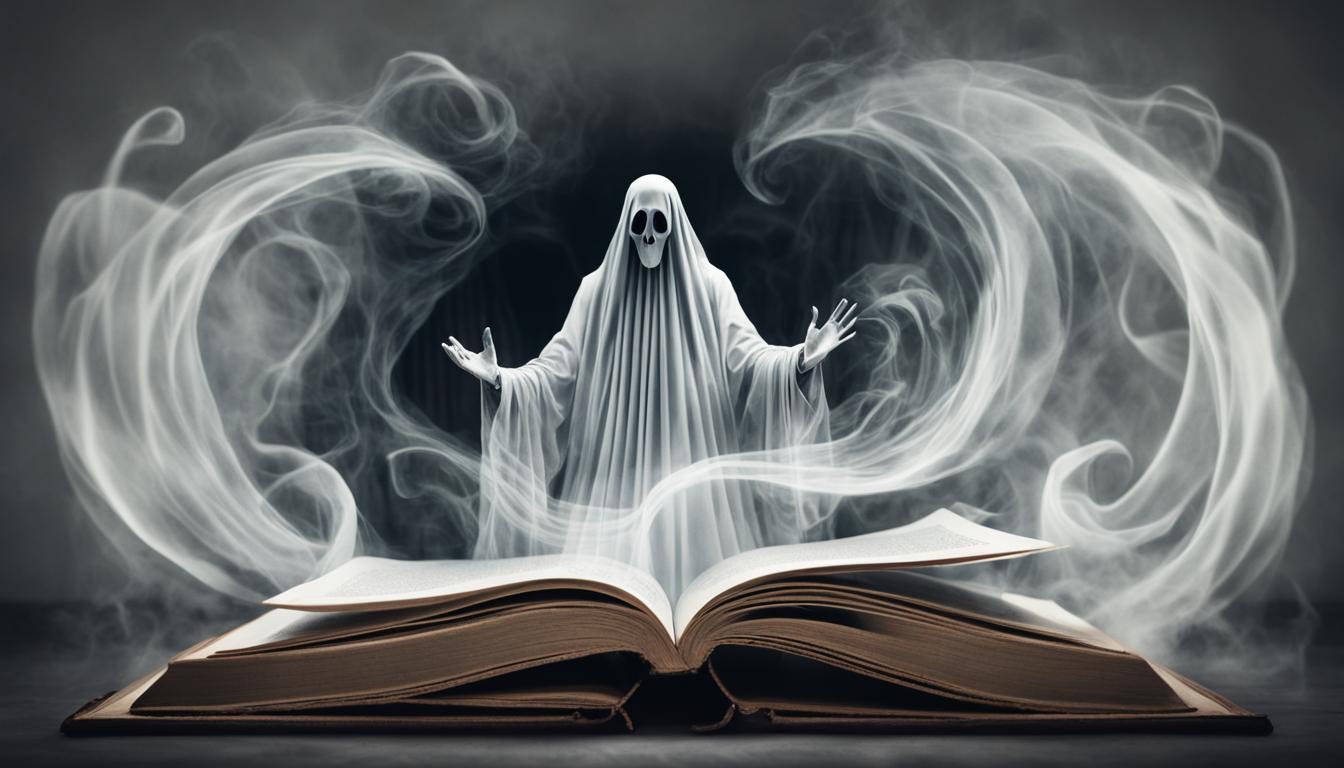Immerse yourself in a world where the pen is not only mightier than the sword but also more dangerous. Our latest audiobook review turns the spotlight on a gripping tale crafted by the masterful Robert Harris. “The Ghost” analysis not only delves into the heart-stopping moments of the narrative but also examines how the audiobook format elevates the tension synonymous with political thriller audiobooks. Whether you’re a loyal fan of Robert Harris novels or a newcomer to his works, this review promises to dissect the elements that make this audiobook a treasured addition to any listener’s library.
Join us as we navigate the murky waters of politics and writing, where truth can be as elusive as a specter in the night, all through the compelling medium of audio. Every whisper and pause in the narration brings to life the intricate web of intrigue and suspense that Harris is renowned for. Prepare to embark on an auditory experience that will leave you questioning the line between reality and fiction.
Discovering “The Ghost” by Robert Harris
Robert Harris, a master of weaving historical accuracy with nail-biting suspense, has etched a permanent place in the annals of political thriller books. The genre, synonymous with intrigue and drama, captures the essence of political machinations and satisfies the reader’s appetite for behind-the-scenes maneuvering. Harris’s work stands out for its intelligent plot constructions and immersive storytelling that transports readers into the very heart of political power.
Introduction to Robert Harris and His Work
Best known for his extraordinary ability to blend real historical figures with fictional narratives, Robert Harris has become a revered name in the genre. His novels, often taking inspiration from the past, provide a lens through which we explore the perennial themes of power, corruption, and loyalty. As an author, Harris has not only penned political thrillers but also ventured into the realms of historical fiction, amplifying his versatility and command over varied subject matter.
The Universal Appeal of Political Thrillers
The political thriller is a genre that transcends borders and cultures, engaging a global readership with universal themes of ambition, ethics, and governance. It is the complexity of the characters intertwined with the intricacies of political systems that offers suspense-filled escapism and, at times, uncomfortable reflections of reality. These books serve as a mirror to our society’s own political scene, resonating with readers who seek to understand the subtle nuances of power.
Brief Overview of “The Ghost” Plot
The premise of “The Ghost” is deceptively straightforward: a professional ghostwriter is brought in to complete the memoirs of a former British Prime Minister. However, the layers of the story unravel, revealing a labyrinth of secrets and deceit. This book serves as a paragon of Harris’s craft, combining his signature attention to detail with the heart-racing urgency of a thriller. “The Ghost” summary captures the essence of Harris’s capability to craft narratives that are both intellectually stimulating and immensely entertaining.
As part of the literary critique of this narrated drama, the following table juxtaposes Robert Harris’s style with the key characteristics of political thrillers:
| Feature | Robert Harris’s Style | Political Thrillers |
|---|---|---|
| Plot Construction | Tightly-woven, intricate, layered | Suspense-driven, plot twists |
| Character Development | Complex, fleshed-out protagonists | Characters often personify larger political ideas and conflicts |
| Historical Elements | Richly embedded, authentic | Varies; sometimes used as a backdrop |
| Thematic Depth | Explores morality, truth, loyalty | Centers on corruption, conspiracy, and ambition |
Engaging with a Robert Harris novel, particularly “The Ghost”, is an intellectual pursuit as much as it is a foray into the depths of entertainment. It offers a conduit through which we can explore our world’s political theater, making us question the very concepts we hold to be self-evident.
The Core Themes of “The Ghost”
Political betrayal, power dynamics, and the fine line between truth versus reality are not just the stuff of gripping fiction; they’re the undercurrents that keep the wheels of real-world politics turning. Robert Harris’s novel “The Ghost” spotlights these core themes to move beyond a simple tale of intrigue to a complex mirror of our society’s political machinations. The recurring theme of betrayal not only advances the plot but dissects the very essence of trust in public office, laying bare the often-unsavory truth behind political rhetoric and legacy.
The narrative skillfully paints a portrait of power dynamics at play. It’s about who holds the power, how they wield it, and the invisible yet potent forces challenging that power from the shadows. Harris’s characters exist in a sphere where the line between truth and fabrication is both blurred and contested, propelling us to question the narrative we’re presented with, both in the book and in our daily digest of political drama.
What complicates these themes even more is their grounding in a reality which is often stranger than fiction. The world of “The Ghost” may be a creation of the literary mind, but its parallels with actual political scenarios can be uncannily close, making the audiobook not just an escape but a thought-provoking reflection on modern governance and ethics.
| Theme | Manifestation in “The Ghost” | Reflection in Real World Politics |
|---|---|---|
| Political Betrayal | The ghostwriter uncovers a web of deceit rooted deep in political alliances. | Whistleblowers and leaked information often reveal unexpected truths. |
| Power Dynamics | Characters navigate the treacherous waters of power, with old alliances shifting and new ones forming. | Political maneuvering and power struggles are a staple in global governance. |
| Truth vs. Reality | The pursuit of truth becomes a dangerous path as it confronts constructed realities. | The media landscape and political narratives constantly challenge the objective truth. |
As you delve deeper into the world of “The Ghost,” keep these themes in mind; they’re the pulse of the tale and the silent commentary on our own living, breathing political climate. In blend of fiction with dashes of non-fictional relevancies, Harris has carved a compelling narrative that remains timely and significant.
Audiobook Experience Versus Traditional Reading
The transition from the tactile feel of paper to the oral storytelling tradition through audiobooks represents a significant shift in the consumption of literature. With audiobook narration, readers are afforded the luxury of an immersive listening experience that can transform the perception of a narrative. For a complex political thriller like “The Ghost” by Robert Harris, this auditory medium brings unique audiobook benefits to the fore.
The Impact of Narration on Storytelling
Narration is the cornerstone of any audiobook, and its quality can drastically affect the listener’s engagement with the story. The narrator’s ability to embody the characters, vary their tone, and modulate their speed ensures that each scene is vividly painted in the mind’s eye. Audiobook narration breathes life into the prose, allowing the suspense and intrigue of a thriller to fully envelop the audience.
Audiobook Features That Enhance “The Ghost”
Specific features inherent to audiobooks can greatly enhance stories, particularly those within the thriller genre. Sound effects, for instance, can heighten tension or signify shifts in setting, while appropriate pacing can underscore dramatic moments. Additionally, the tone set by the narrator can influence the emotional response to the story, from the conveyance of dread to the stimulation of curiosity.
| Audiobook Feature | Enhancement to “The Ghost” | Traditional Reading Comparison |
|---|---|---|
| Voice Acting | Adds depth to characters and emotional resonance | Dependent on reader’s imagination for character depth |
| Sound Effects | Builds atmospheric tension | Absence of auditory stimulus |
| Pacing | Narrator controls flow to enhance suspense | Reader controls pace, which may affect suspense |
| Tone | Injects nuance into dialogue and narrative descriptions | Tone interpreted uniquely by each reader |

Understanding the Characters of “The Ghost”
The narrative success of Robert Harris’s “The Ghost” hinges significantly on its character development and the intricate protagonist analysis. Central to the audiobook’s appeal are the fictional personalities that drive the story forward, particularly the unnamed ghostwriter and the formidable ex-Prime Minister Adam Lang. These characters are the lifeblood of the narrative, with their layered personalities, motives, and dynamic growth capturing the listeners’ imagination.
Through the deft narration, we’re granted extensive insight into the ghostwriter’s psyche, providing a protagonist analysis that is both nuanced and compelling. This character serves as the audience’s entry point, guiding us through a multi-faceted exploration of political intrigue. Meanwhile, Adam Lang’s portrayal showcases the height of character development, with his charismatic yet enigmatic personality leaving an indelible mark on the storyline.
Character flaws and motivations are not just footnotes in this political thriller; they represent essential clues that piece together the overarching puzzle. Through the evolution of these fictional personalities, Harris manages to create a vivid and relatable world, echoed in the audiobook by the narrator’s skillful delivery of each personage’s unique voice and demeanor.
The audiobook medium adds a new dimension to uncovering these complex figures, as the narrator brings subtle vocal nuances to each dialog, thought, and interaction. The characters’ development is further enhanced by audible cues which signal changes in temperament and intent—a testament to Harris’s understanding of character as a fundamental storytelling element.
- The ghostwriter begins as a vessel for another’s story but grows into his role as detective and moral arbiter, shaping the narrative’s moral compass.
- Adam Lang, on the other hand, with his mix of charm and potential duplicity, projects the perfect image of a political front man whose ambitions and secrets define the novel’s suspenseful landscape.
In conclusion, the characters of “The Ghost” are rendered with precision and depth. The audiobook format, through its vibrant and astute narration, bolsters this character development, leaving listeners with a rich, thought-provoking experience that spans well beyond the final chapter.
Unpacking the Setting: A Character in Its Own Right
When delving into the layered suspense of a political thriller like “The Ghost,” it’s imperative to acknowledge the role of setting beyond mere backdrop. It is the soil from which the narrative’s tension and drama bloom, shaping not only the aesthetic but also the very psyche of the novel. The geographical influence on character development and plot progression cannot be overstated—it is here where a location transitions from static environment to dynamic catalyst.
Significance of Location in Political Thrillers
Political thrillers thrive on a palpable sense of place that goes beyond the physical to encapsulate the essence of power struggle and conspiracy. Setting as a character in itself, these mood-setting locations epitomize the underlying tensions of the narrative and mirror the tumultuous journey of the characters involved. The influence they wield can signify a turning point, a sanctuary, or an inescapable trap that drives the story’s momentum.
How the Setting Influences the Story’s Atmosphere
Specific locales can also reflect themes or offer a silent commentary on the events unfolding within the storyline. Through detailed description and the subtle nuance of environmental interaction, settings in “The Ghost” carry a geographical influence that imbues the novel with an air of authenticity and urgency. They are not mere pins on a map but living entities contributing to the complex dance of intrigue.
| Setting | Atmospheric Contribution | Narrative Significance |
|---|---|---|
| Urban landscapes | Imparts a fast-paced, high-stakes tension | Serves as battlegrounds for political maneuvering |
| Isolated locales | Evokes a mood of introspection and impending danger | Reflects the isolation felt by the protagonist in their journey |
| Governmental edifices | Symbolizes power and the weight of history | Reinforces the themes of authority and secrecy |
| Domestic spaces | Creates intimate scenes contrasted against the public façade | Explores the personal dimension of political life |
Diving Deeper into the Plot’s Intricacies
The audiobook of “The Ghost,” with its plot analysis, peels back the various narrative layers, revealing the meticulous craftsmanship of Harris’s writing. Not only does the plot offer a suspenseful storyline, but it also interweaves political commentary within its twists and turns, making it a prime focus for those keen on unraveling the web of storytelling in political thrillers.

One of the most compelling aspects of “The Ghost” is the narrative’s ability to maintain a gripping sense of urgency. From the initial scenes to the climactic conclusions, the listener is kept in a state of anticipation, always questioning the motivations behind each character’s actions. The intricacies of the plot reveal themselves layer by layer, akin to a game of chess, with each move by the characters unlocking deeper dimensions of the storyline.
“In ‘The Ghost’, each chapter builds upon the last, creating an intricate maze that captures the listener and refuses to let go until each secret has been unveiled.”
As the ghostwriter begins to delve into his subject, the former prime minister’s past, the narrative layers reveal themselves to include not just political dilemmas but also personal ones. We are presented with a complex web where the public and private spheres collide, creating a nuanced and multidimensional experience.
The following table illustrates the progression of the plot’s complexity through key points in the storyline:
| Chapter | Key Events | Impact on Suspense |
|---|---|---|
| Opening | Introduction to the ghostwriter’s new assignment. | Establishes baseline of curiosity. |
| Mid-Story | Discoveries begin to raise the stakes. | Suspense heightens with each revelation. |
| Climax | Crucial truths come to light amidst danger. | Peak suspense as the narrative reaches its zenith. |
Invariably, it is Harris’s skill at crafting a narrative with multiple layers that ensures “The Ghost” remains an unpredictable journey. By the time the secrets begin to unfold, the listener is deeply enmeshed in the tangled affairs of power, truth, and deceit — further testament to the plot’s architectonic precision.
Comparing “The Ghost” to Other Works by Robert Harris
Robert Harris’s literature stands as a beacon of deft narrative craft, with “The Ghost” offering a prime example of his facile ability to interlace historical context with modern-day suspense. The thematic exploration of both personal and political morality in this particular work mirrors the intricate storylines found in his other novels. A literary comparison between “The Ghost” and Harris’s broader oeuvre reveals a pattern of his engrossing writing style and persistent thematic presence.
Stylistic Elements Unique to Harris’s Writing
The hallmark of Robert Harris writing style lies in his seamless blending of factual history with speculative fiction, a skill that delivers not merely a story but an immersive experience. “The Ghost” thrives on his signature narrative tension and meticulous attention to detail, characteristics that engage readers with every page turn, or in the case of audiobooks, with every word uttered.
Themes Commonly Explored in Harris’s Novels
Power, history, and the often-muddy waters of morality are the thematic backbones found throughout Harris’s works. “The Ghost” is concurrent with themes of political intrigue and the ethical dilemmas that high stakes bring about, resembling the thematic exploration undertaken in novels like “Enigma” and “Archangel,” where personal clashes with political and the past often haunts the present. The persistent questioning of reality versus truth is a tangible commonality that echoes in his diverse yet unmistakably characteristic collection of literature.
Audiobook Review: “The Ghost” by Robert Harris
The auditory landscape of digital storytelling comes to full life in Robert Harris’s audiobook “The Ghost”. In this critique, we delve into the nuances of the auditory experience, offering an analysis of the performance assessment that elevates the narrative beyond the printed page.
Evaluating the Overall Performance
The vocal prowess and inflection brought forth by the narrator in “The Ghost” are exemplary. The audiobook critique begins with acknowledging the seamless blend of tone and tempo, which serves to ensnare the listener’s full attention. Voice acting, key in any performance assessment, is nothing short of stellar, adeptly expressing a range of emotions that mirror the novel’s intensity and suspense.
Audio Quality and Technical Aspects
Equally important in our audiobook review is the technical appraisal of audio quality. Here, listeners encounter a masterclass in sound engineering—every word is crisp, every pause meticulously calculated, and the production value adheres to the highest standards. The following table presents a comprehensive assessment of the technical aspects:
| Technical Aspect | Details | Impact on Experience |
|---|---|---|
| Clarity | Exceptional clarity, no distortions | Enhanced engagement and understanding |
| Volume Balance | Consistent levels throughout | Seamless auditory experience |
| Sound Effects | Subtle and supportive of the narrative | Added depth to storytelling |
| BG Music | Minimal and non-distracting | Maintained focus on the narrative |
Listener’s Emotional Journey Throughout the Audiobook
The crux of an engaging auditory experience rests within its capability to evoke and sustain an emotional journey. “The Ghost” excels at this, with its pacing and suspense pushing the listener through a roller coaster of tension and catharsis. Key moments of the plot are masterfully heightened by the narrator’s performance, leaving the listener wholly immersed in the depths of the story’s intrigue.
In summation, the audiobook version of “The Ghost” is a triumphant reimagining of the novel. The critique highlights its success in transforming written words into a full-bodied auditory experience, noteworthy of any performance assessment.
Conclusion
In our exploration of “The Ghost” by Robert Harris as an audiobook, we’ve delved into various facets that contribute to its stark and engaging narrative, from the suspenseful thematics to the deeply woven character portrayals. The audiobook format brings a distinct dynamism to the tale, with narration adding an immersive layer to the already compelling story. Our dissection has spanned the intricacies of plot, setting, and character developments, each magnifying the other to create an auditory experience that is both engrossing and reflective of the shadowy corridors of political power.
Final Thoughts on the Impact of “The Ghost”
Robert Harris’s “The Ghost,” when consumed in audiobook form, transcends a mere retelling of printed words. It stands as a testament to audio storytelling’s power to evoke the subtleties of human emotions and the complexities of political landscapes. The production quality, combined with the haunting delivery of the voice actors, deepens the impact of the story’s revelation of truth versus reality, leaving an indelible mark on the listener’s consciousness.
Is the Audiobook Worth Your Time?
Weighing all elements discussed, from the profound character exploration to the atmospheric tension, the final audiobook verdict is this: “The Ghost” is a commendable listen. Our audiobook recommendation is backed by the effective synergy of Robert Harris’s rich writing and the nuanced auditory execution. For those captivated by the implications of political intrigue and the art of suspense, this audiobook not only warrants your time but promises to redefine your audiobook experiences. In dissecting the implications of “The Ghost,” one finds not just a story but a mirror to the opaque world of political maneuvering, solidifying its place as a definitive listen.



